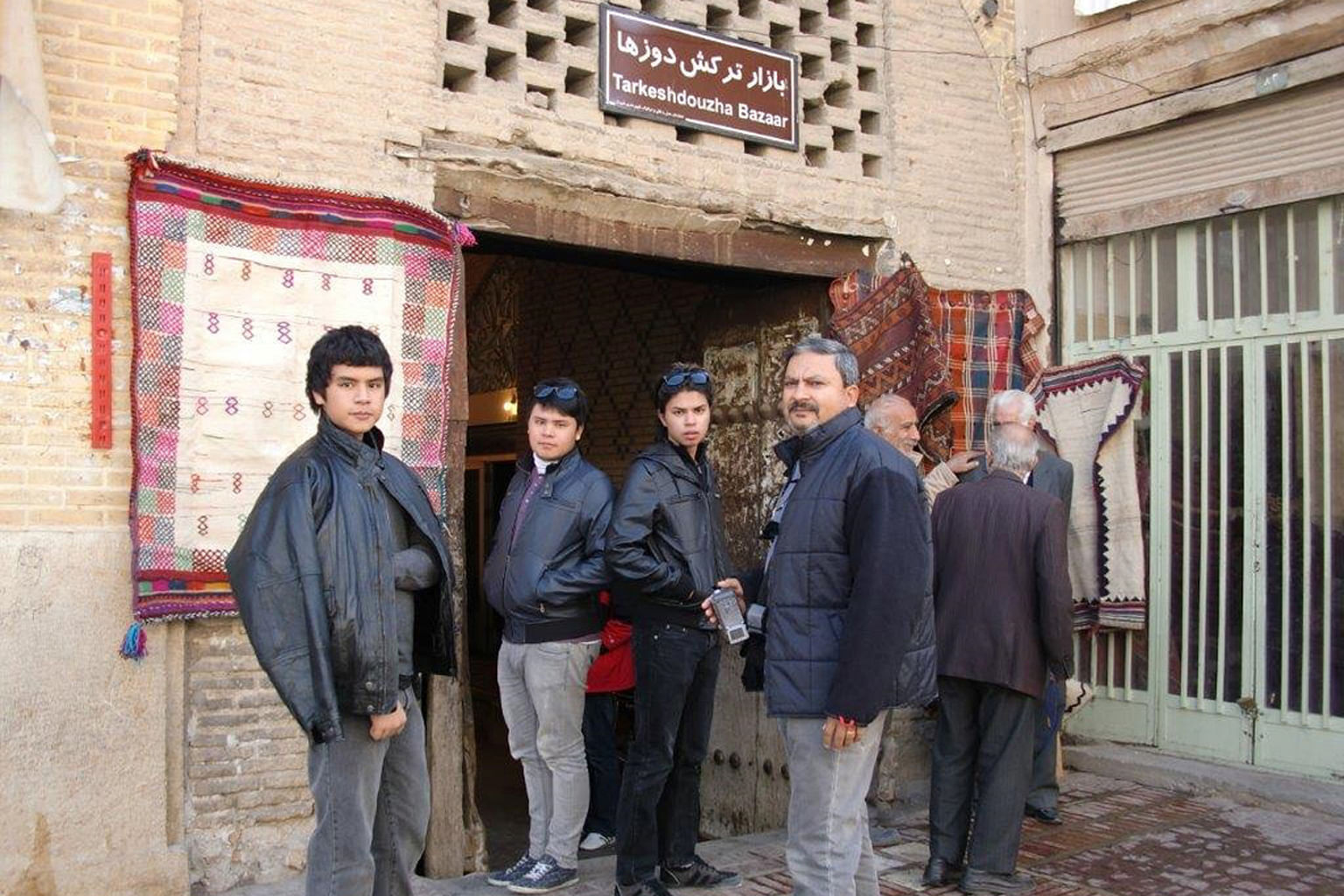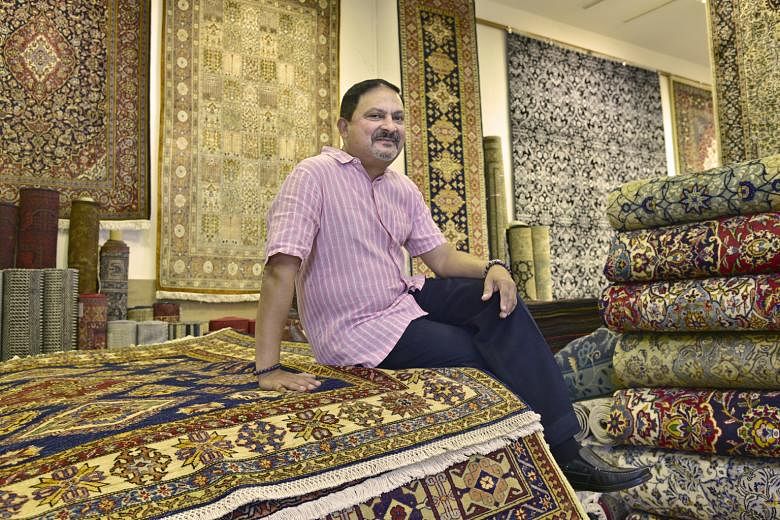It is a classic conundrum.
A man spends the greater part of his life building a successful business. His children, however, are not interested in taking over.
He wrestles with resentment against his offspring, and disappointment with himself for failing to secure an entrepreneurial legacy.
For a few years, this was the case with Mr Peter Hedger, whose four sons have told him they want to pursue careers in music, journalism and event planning, not run or expand the carpet business he painstakingly built.

"I was upset. Then I realised it's probably fated. How the hell did I know I was going to end up a carpet dealer anyway?" says the 59-year- old founder of Hedger's Carpet Gallery in Dempsey Road.
His foray into the business was accidental. At 21, fresh out of the army, he had applied to become a carpet salesman because he needed money to complete his part-time Diploma in Building at the Singapore Polytechnic.
It led to an intense love affair with carpets, rugs and runners, one which took him to all corners of the globe and lifted him out of poverty.
An oddity, Mr Hedger is the only Eurasian in the local carpet trade, one dominated by Indians, Pakistanis, Kashmiris and Iranians.
His late father was an Englishman from Chelsea who came to Singapore after World War II, and worked with the Fleet Air Arm of the British Army. His mother was born in Pondicherry, India, and worked as a bank clerk before marriage.
Their union came under great pressure, buckling under the weight of expectations, racial prejudice and financial problems.
Hoping for higher pay, his father left his general dogsbody army job but failed to land anything better. A judo exponent, he was reduced to giving occasional classes in the YMCA which did not bring in much.
"I didn't realise how hard it must have been for him until I grew up. In those days, angmohs had the good jobs and were the bosses," he says, using the local slang for Caucasians.
"He really struggled. There was a lot of frustration at not being able to find a decent job and bring home the bacon."

Although his mother came from a well-to-do family, she was looked down by relatives for marrying a white man, and a poor one at that.
With three children to look after, she worked intermittently as an amah in a hospital.
For a couple of years before they got a three-room flat in Toa Payoh Lorong 5, they lived in a one-room rental flat in Toa Payoh Lorong 1.
Mr Hedger's parents vented their frustrations on each other, both verbally and physically, their skirmishes often attracting curious neighbours.
"I hated staying at home," he says, adding that his self-esteem suffered. "I was very quiet and reserved. I had nothing, what was there to shout about?"
Because the family was so strapped, the former student of St Gabriel's Primary and Secondary often had no money to take a bus to school, let alone pocket money for recess.

"I'd go to bed hoping that there'd be 20 cents on the table when I woke up. If there wasn't, I'd go back to sleep. I probably attended school just three times a week," he says.
His plight came to the attention of his classmates, who alerted the Society of St Vincent de Paul, a Catholic charity, when he was in Secondary 3. The school principal interviewed and counselled him, and put him on the list for aid.
The weekly stipend of about $5 was a godsend. "Hallelujah, I could go to school. During recess, I could actually get something to eat; I used to go and hide or sit in the football field all by myself.
"I even managed to save. That was really important because we needed to pay, in those days, to sit our O levels. I don't know what would have happened if I didn't have the money."
After his O levels, he became an office boy with a company selling tiles in Robinson Road. One day, while out delivering documents, he impressed the boss of an architectural firm with his spoken English.
The man offered him a job. Noticing that Mr Hedger was competent in maths and science too, he advised the young man to consider studying part-time for a Diploma in Building at the Singapore Polytechnic.
"He wrote me a letter of recommendation but I had to pay my own way," he says.
National Service (NS) beckoned after he finished his second year; he was assigned to the Police Reserve Unit.
Among other things, he was deployed to do crowd control at football matches and went on special operations to nab peeping Toms at the Japanese Garden.
In 1978, while on guard duty in Jurong Camp, he saw a Skyhawk jet experiencing trouble in the air.
"The next thing I knew, someone ejected and the plane crashed. I pressed the emergency button and the ang chia went out even before the official call for help came," he says, using the Hokkien term for the red iconic anti-riot vehicle.
The Skyhawk caused an explosion in a chicken farm in Hong Kah Drive, razing the chicken sheds. The two pilots managed to eject to safety.
Around this time, his father suddenly left the family and went home to England.
"I guess he couldn't take it any more. I was very judgmental and resented him for a long time," he says.
But when he grew older and became a father himself, he believed that his father left probably because he felt he had no choice.
Two decades later, Mr Hedger took his family to visit his father in Colchester in Essex.
"He was living in a council flat, still giving judo classes and had become an astrologer. I did not tell my mother about the trip. When I saw him, I just wanted to hug him," he says, voice breaking and eyes reddening.
"I didn't ask him why he left. Maybe he had issues. Maybe it was meant to be like that. Maybe if both my parents had money, I would be an a*****e today," he says, wiping away tears.
The elder Hedger visited Singapore several years later with his new wife and son.
"They stayed with us. My siblings saw him too. We didn't tell our mother but I think she knew," says Mr Hedger, whose mother died in 2013, and his father, in 2015.
After NS, Mr Hedger decided that completing his diploma was the first order of the day .
He responded to an ad for a carpet salesman and turned up for the interview at Oriental Carpet Palace in the Tanglin area.
"I was very tanned from the army and had a moustache. I guess I fitted the stereotype of a carpet dealer and got the job," he says.
His boss Zephyr Amir - who authored a book, Supreme Persian Carpets - was then one of the most famous carpet dealers in town.
"He had two Rolls Royces, two Mercedes and a Honda and was very charismatic. He dealt with ambassadors, bankers and all sorts of high-end clients," he recalls.
From Mr Amir, he learnt a lot - not just about carpets but also salesmanship and grooming.
Sometimes, he would travel with him on buying trips to places like Pakistan and Iran before the revolution in 1979.
"I was very curious. I read a lot of books, grilled carpet repairers and asked people so many questions that they avoided me. I found it intriguing and fascinating," he says.
A question about how to tell the origins of carpets gets him animated.
"You have to look at the design, the colours used, whether it's made of wool or silk, and if it's wool, is it wool from the north or the south? You have to look at the type of knots used... Only then can you more or less come to a conclusion."
At 25, he got married; his wife Sheila worked at an accessories shop at the Mandarin Hotel in Orchard Road.
"In those days, the Japanese were kings of consumerism. They would walk into the shop where she was working, and take five Missoni scarves, 10 Gucci wallets," he says.
When a 300 sq ft shop unit in the hotel became available in 1985, his wife suggested that they strike out on their own.
Mr Hedger discussed the idea with his suppliers, who encouraged him and promised him that they would supply him carpets on consignment.
He plonked $8,000 into the business and recouped it within six months. Besides carpets, he also sold brassware and jewellery boxes.
When a second unit became available not long after, he and his wife started a boutique, Santini Collection, which sold Italian fashion and accessories.
The Japanese economy, however, got into trouble in the early 1990s.
"Everything just dried up; it became a ghost town," he says.
The couple closed Santini. But Mr Hedger was convinced there was enough custom among the expatriate and other communities in Singapore to justify a bigger carpet shop.
Ignoring naysayers who said it was foolhardy, he upsized his carpet business and moved it to an 800 sq ft shop in Holland Village in 1991.
He decided to go into auctions, focusing on quality, variety and good prices.
"I'm a shy guy but I had to put on a tie and professionally beg," he says jocularly.
It was a turning point; the business boomed. He also organised classes on carpets for different groups to promote his business.
"From 1991 to 1997, we were on a roll. We sold nearly 300 carpets a month," he says.
There were some hiccups along the way. In 1993, their home off Holland Road was burnt down due to a short circuit.
Although no one was hurt, everything in his home was burnt, including his wedding and childhood photos.
"Thankfully I was insured," he says. "The incident taught me not to fuss about small things. We have to live life."
Mr Hedger rode out other bumps, including the terrorist attacks of Sept 11 in 2001 and the Lehman Brothers crash of 2008, over the years.
When rents in Holland Village became astronomical, he moved to his current premises - a 2,500 sq ft space in Dempsey - in 2007.
Because of what he has gone through, he has a soft spot for underprivileged children and youths at risk. He sits on the exco of The Gabrielites, the old boys' association of St Gabriel's.
He regularly donates carpets which are auctioned off to raise funds for the less fortunate not just at his alma mater, but also other institutions like Montfort, Boys' Town and Assumption Pathway.
Mr Hedger, whose sons are aged between 21 and 28, believes in treating people right.
His shop manager, Ms Alice Chong, has been with him for more than 30 years.
"She has only primary education but I forced her to learn the computer and other things. Today, she is the only Chinese woman in the carpet trade here. I'm the only Eurasian," he says with a guffaw.
Meanwhile, he has come to terms with his children's career plans.
"They're big enough to know what they want. Anyway, life is what you make of it, isn't it?"


